

The Naive Approach to Hiring People. The Naive Approach to Hiring PeopleEvery once in a while I read (or write!)
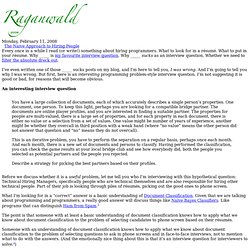
Something about hiring programmers. What to look for in a résumé. What to put in your résumé. Why _____ is my favourite interview question. Why _____ sucks as an interview question. I’ve even written one of those _____ sucks posts on my blog, and I’m here to tell you, I was wrong. An interesting interview question You have a large collection of documents, each of which accurately describes a single person’s properties. Before we discuss whether it is a useful problem, let me tell you who I’m interviewing with this hypothetical question: Technical Hiring Managers, specifically people who are technical themselves and are also responsible for hiring other technical people. What I’m looking for in a “correct” answer is a basic understanding of Document Classification. If Statements vs. Oh, the irony. There are really two approaches to take in selecting candidates.
The second approach is the classifier approach. No? The Guerrilla Guide to Interviewing. By Joel Spolsky Thursday, March 23, 2000 This is a very old version of an article that has since been extensively rewritten.
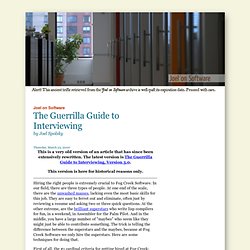
The latest version is The Guerrilla Guide to Interviewing, Version 3.0. This version is here for historical reasons only. Hiring the right people is extremely crucial to Fog Creek Software. First of all, the #1 cardinal criteria for getting hired at Fog Creek: Smart, andGets Things Done. That's it. Smart is hard to define, but as we look at some possible interview questions we'll see how you can ferret it out.
Now, people who Get Things Done but are not Smart will do stupid things, seemingly without thinking about them, and somebody else will have to come clean up their mess later. The most important rule about interviewing: Make A Decision At the conclusion of the interview, you have to be ready to make a sharp decision about the candidate. There is no other possible answer. Never say "Maybe, I can't tell. " But how do you make this difficult decision? My favourite interview question. My favourite interview questionSome years back, I was interviewed by an interesting start-up in Palo Alto.
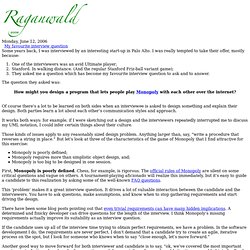
I was really tempted to take their offer, mostly because:One of the interviewers was an avid Ultimate player;Stanford. In walking distance. (And the regular Stanford Friz-ball variant game);They asked me a question which has become my favourite interview question to ask and to answer.The question they asked was: How might you design a program that lets people play Monopoly with each other over the internet? Of course there’s a lot to be learned on both sides when an interviewee is asked to design something and explain their design. It works both ways: for example, if I were sketching out a design and the interviewers repeatedly interrupted me to discuss my UML notation, I could infer certain things about their culture. Getting the Interview Phone Screen Right. The job market for software developers is hot.
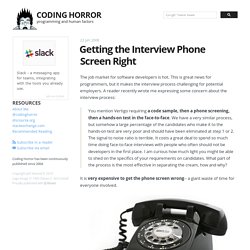
This is great news for programmers, but it makes the interview process challenging for potential employers. A reader recently wrote me expressing some concern about the interview process: You mention Vertigo requiring a code sample, then a phone screening, then a hands-on test in the face-to-face. We have a very similar process, but somehow a large percentage of the candidates who make it to the hands-on test are very poor and should have been eliminated at step 1 or 2. The signal to noise ratio is terrible. It is very expensive to get the phone screen wrong-- a giant waste of time for everyone involved.
The best phone screen article you'll ever find is Steve Yegge's Five Essential Phone-Screen Questions, another gift to us from Steve's stint at Amazon. Steve starts by noting two critical mistakes that phone screeners should do their best to avoid: Don't let the candidate drive the interview. How to edit your resume like a professional resume writer. It’s very hard to write your own resume because a resume is a macro view of your life, but you live your life at the micro level, obsessing about daily details that have no bearing on your resume.
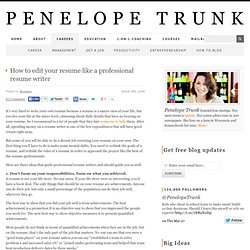
So I recommend to a lot of people that they hire someone to help them. After all, spending money on a resume writer is one of the few expenditures that will have good return right away. But some of you will be able to do a decent job rewriting your resume on your own. The first thing you’ll have to do is make some mental shifts. You need to rethink the goals of a resume, and rethink the rules of a resume in order to approach the project like the best of the resume professionals. Here are three ideas that guide professional resume writers and should guide you as well: 1. The best way to show that you did your job well is from achievements. Most people do not think in terms of quantified achievements when they are in the job, but on the resume, that’s the only part of the job that matters.